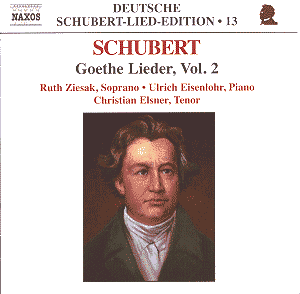Naxos’s Schubert-Lied
Edition is organised by poet and this
volume is the second of Schubert’s Goethe
Lieder. The first volume was sung by
the baritone Ulf Bästlein. Here
we have the soprano Ruth Ziesak, accompanied
by Ulrich Eisenlohr. Eisenlohr is the
artistic director of the series but
he does not appear on every disc.
Not surprisingly, in
a recital of Schubert’s Goethe settings
sung by female voice, Mignon and Gretchen
feature quite strongly. Of the 24 songs
on the disc, half of them relate to
Mignon. This is partly because Schubert
seems to have compulsively re-worked
these songs, setting the same poems
repeatedly. There are 5 settings of
‘Nur wer die Sehnsucht kennt’ including
one done as a duet. This introduces
the tenor, Christian Elsner who appears
in this and another duet as well as
being allocated ‘An Mignon’ for his
pains. In ‘An Mignon’, Goethe the poet
was commenting on Mignon so it makes
sense to include the song on this disc
but have it sung by a male voice.
Gretchen features in
three of the songs. Besides the well
known ‘Gretchen am Spinnrade’, the recital
features two excerpts from Schubert’s
abortive Faust opera. Gretchen im Zwinger
is a haunting incomplete piece. The
third excerpt is the ‘Szene aus Faust’,
which takes place during the singing
of the requiem. A harmonically complex
recitative between Gretchen and the
Evil Spirit is periodically interrupted
by the choir singing verses from the
Dies Irae. Here Christian Elsner sings
both the Evil Spirit and the choir,
skilfully managing to differentiate
between them both. One final dramatic
work by Goethe is featured; the song
‘Die Liebe’ is taken from his drama
‘Egmont’.
This is an attractive
and well structured recital. Ruth Ziesak
has a pleasing, rather plangent voice
whose melancholy cast suits the nature
of many of these songs. You will not
go far wrong if you buy this disc, but
it highlights one of the weaknesses
of Naxos’s series. By allocating all
of the discs to young German singers
we do get singers singing in their native
tongue; this is a positive advantage.
But the singers can lack the experience
required to bring out the best in these
songs. Ziesak sings with commendable
diction, but she does not always make
a good connection between words and
music. Her interpretations are rather
generalised and she does not adequately
vary her tone. The art of lied singing
involves storytelling and Ziesak does
not do this often enough and her singing
lacks intensity. By not varying her
tone and not drawing the listener in,
Ziesak runs the danger of monotony.
She is at her best in the more strophic
songs and at her weakest in such items
as the more complex Suleika songs, which
set texts by the 30 year old Marianne
von Willemer with whom the 65 year old
Goethe had a passionate affair. Eisenlohr
is an exemplary accompanist and his
playing is one of the joys of the record.
Christian Elsner acquits himself well
and I would like to hear more of him.
One of the joys of
this sort of disc is the discovery of
items which you have forgotten or never
knew. This was true for me of the two
duets, ‘Mignon and the Harper’ and the
‘Scene from Faust’. Elsner helps give
these two pieces a strong impact.
This is an attractive
disc and at super budget price it is
highly recommendable. But most people
seriously interested in this repertoire
will need to invest in another disc
as well. EMI’s Janet Baker set, which
covers quite a lot of this repertoire,
is very well worth investigating.
Robert Hugill
see also
review by Colin Clarke
For reviews of other releases in this
series,
see the Naxos
Deutsche Schubert-Lied Edition page
